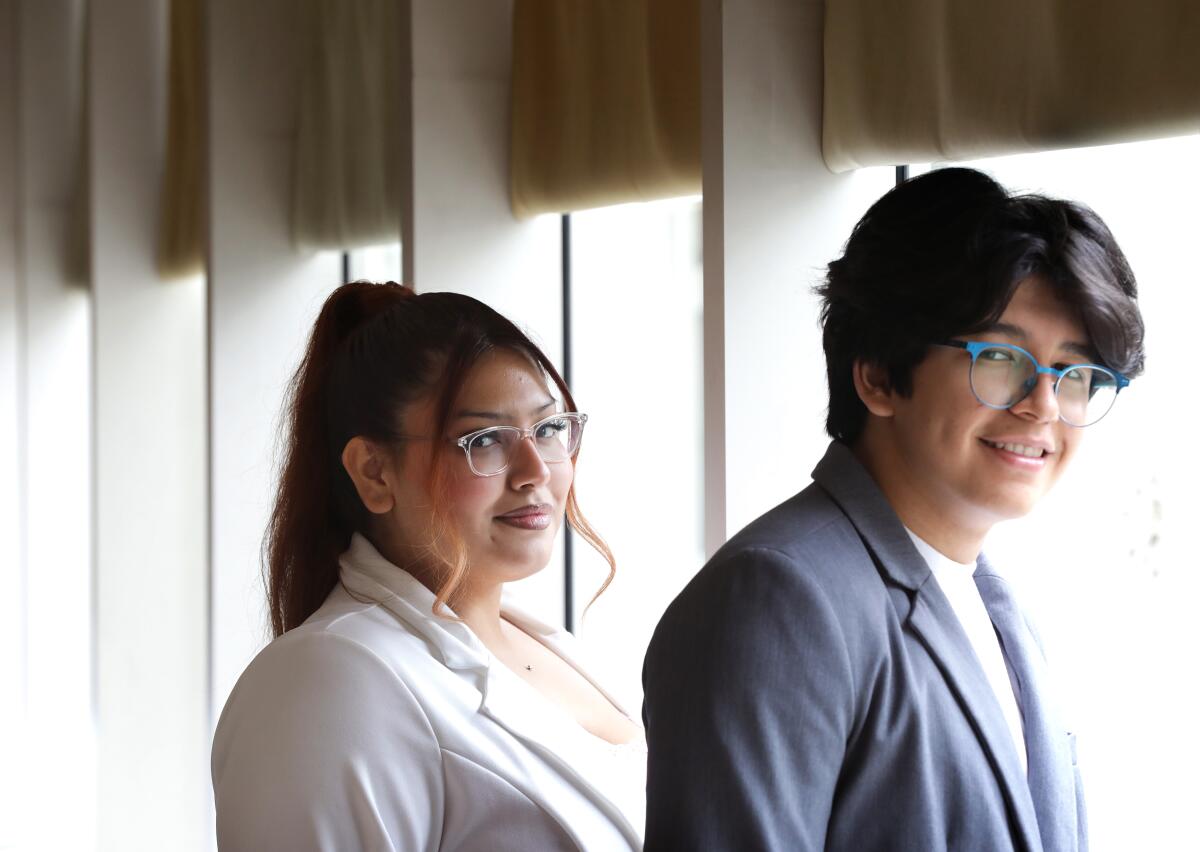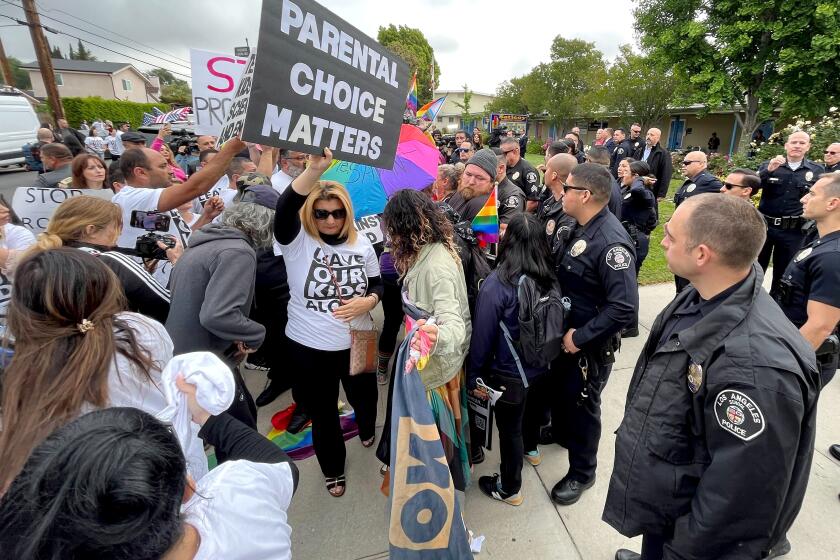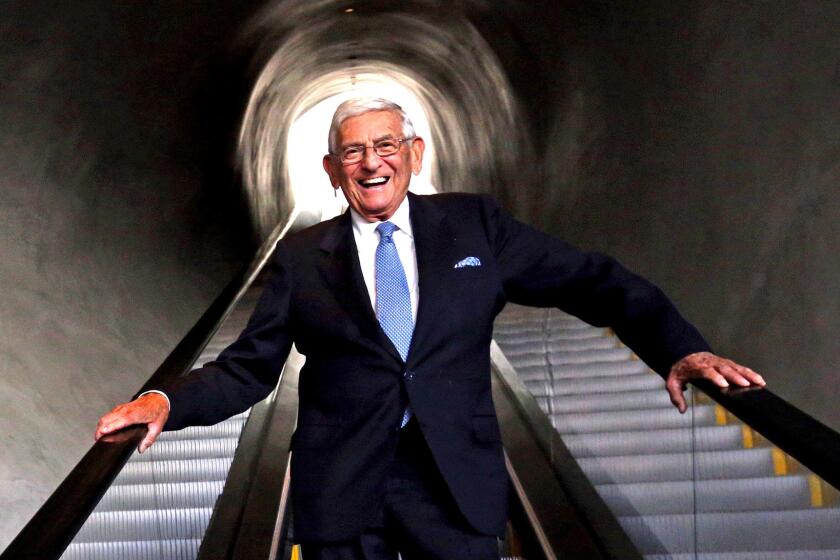What do students want after school? Mental health help, good food and a place to stay

An after-school program can make a life-changing difference, but it’s not reaching enough students, according to Haziel Gonzalez, a 16-year-old junior at the selective Los Angeles County High School for the Arts.
His words embodied the general message at the Friday kickoff for an effort to make high-quality after-school programs widely available across the county. It has major startup funding from the Eli and Edythe Broad Foundation.
The event, at the Omni Hotel downtown, brought together 200 after-school providers, other community groups, educators, public agencies — and students.
Haziel makes good grades and studies instrumental jazz and music production. But he knows of peers from El Sereno Middle School who died by suicide or are incarcerated because of gang involvement.
Outside Saticoy Elementary School in North Hollywood, parents protesting a Pride Day assembly clashed with police and counterprotesters supporting LGBTQ+ rights and education.
The son of a single mother who had recently emigrated from Mexico, he sees a lot of similarities between his background and those of his former classmates.
Around age 11, he was recruited into participation with Legacy L.A., which “pushed us to grow by exposure to different topics and social justice issues. So from a very young age, I was aware of the school-to-prison pipeline.”
His after-school program was “gathering students, educating them and creating the sense of unity and power.”
Ayleen Gaytan, born to a 16-year-old, recounted a similar experience at Legacy, which provided homework help as well as exposure to mindfulness and academic enrichment unrelated to school work.
“It was always an activity, every day something different,” said Ayleen, a senior at Lincoln High in Lincoln Heights. “It encouraged me to go, and the more that I kept on attending, the closer I got to my peers that were also attending.”
Ayleen, 18, plans to attend Cal State Northridge this fall and major in psychology.
She added that support from peers and mentors helped her navigate mental health challenges.
Surveys of local students show that students want after-school services to include mental health support. They also want them to include good-quality food.
The founder of Legacy, Lou Calanche, is heading the new countywide effort, called ExpandLA. She said about one-third of county school-age students participate in an after-school program. Most of those in the other two-thirds are in dire need of such services.
Factors that keep them out include cost as well as limited locations and hours.
There’s also uneven quality. Some groups struggle to provide training while also dealing with high turnover and unfilled positions. Even basic after-school supervision — babysitting might be another word for it — remains in short supply.
Calanche’s original Boyle Heights-based nonprofit has grown to serve about 300 students with high-intensity services, including family counseling and ongoing tracking. Her model is among the most expensive, making it challenging to bring to scale. Still, she’d like to see similar hubs of service across the county.
There’s a window for making things better — $4 billion in new statewide funding. Advocates want to make sure L.A. gets its share.
“It also will require accountability,” Calanche said. “What we worry about is that if we’re not showing impact then maybe the next administration would move that money out as some other priority comes up.”
ExpandLA has the mission of pushing for streamlined systems, better coordination between groups and agencies, and more funding.
Eli Broad, a billionaire philanthropist and art collector, played a central role in building such Los Angeles institutions as Walt Disney Concert Hall and the Museum of Contemporary Art before building his own museum, the Broad.
A spokeswoman for the Broad Foundation declined to say how much funding the organization has committed. It’s the foundation’s first major public launch in education since the 2021 death of co-founder Eli Broad, although work in this arena began before that.
Other recent foundation work in education has included supporting summer activities for students during the pandemic and developing up-to-date job skills. Some of Broad’s education initiatives were controversial — and consciously so — as he tried to shake up what he considered a status quo that was harmful to students.
This latest effort has widespread buy-in, although that will not make success easy. Other funders are being sought.
L.A. schools Supt. Alberto Carvalho, in a midday address, spoke of “an urgency associated with this moment.”
“We will do the reading and the mathematics, the science and social studies. But how about the rest?” he said. “We will provide art and music within the school, but how about the rest? Because we know what the inequity feels and looks like in this community.”
Some families can afford to provide so much for their children, but “there are some kids who never leave, never go anywhere. You stand for them and you stand with them,” he told those in attendance, “providing them the enrichment and the activities they deserve, and so desperately need.”
There’s no learning or enrichment opportunity that should be wasted, said county Board of Education member Yvonne Chan.
“Some people are thinking learning is OK now, but it’s not OK,” Chan said. “We absolutely need to use every moment.”
More to Read
Sign up for Essential California
The most important California stories and recommendations in your inbox every morning.
You may occasionally receive promotional content from the Los Angeles Times.













